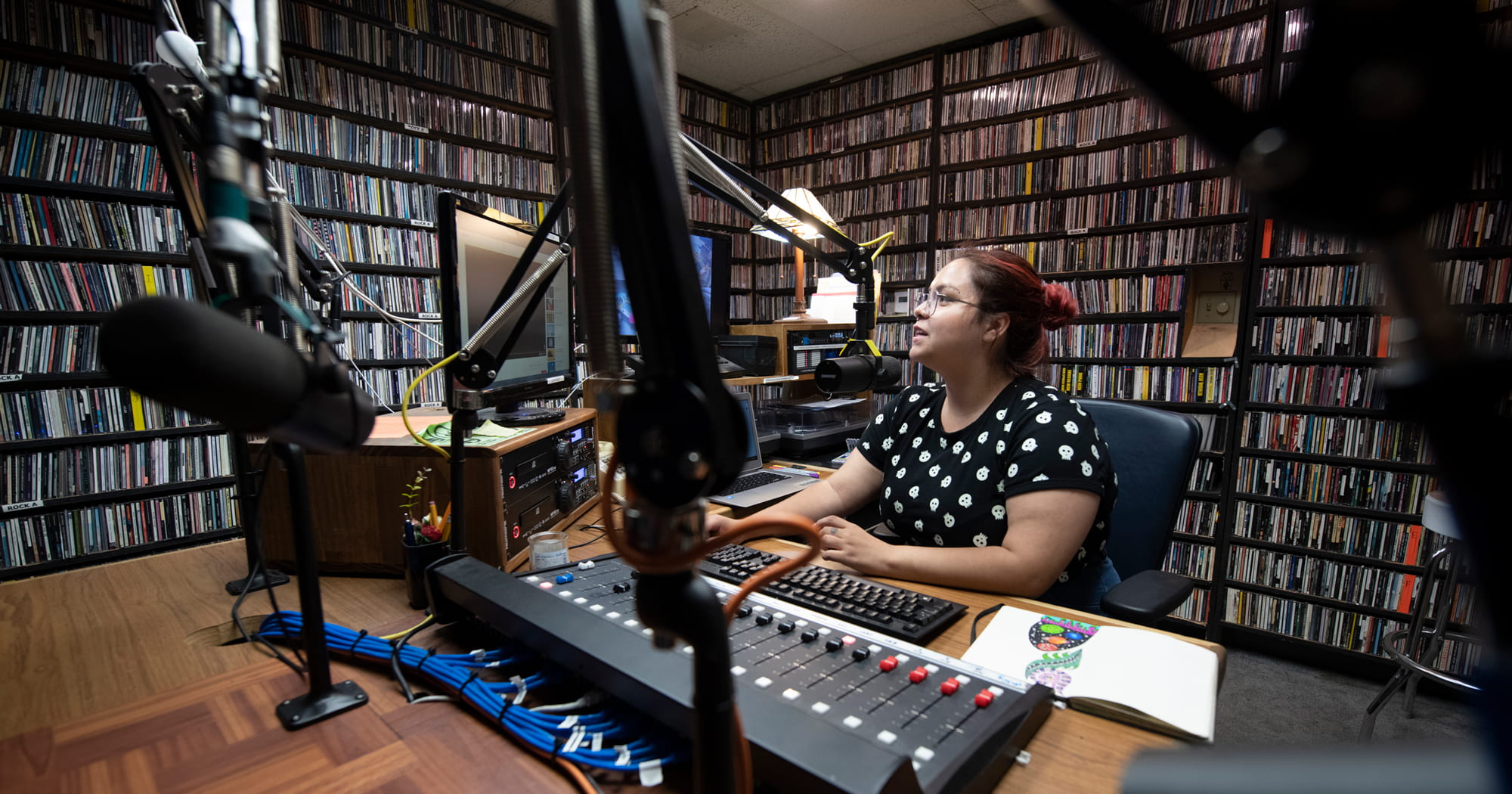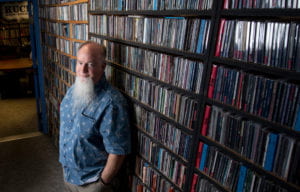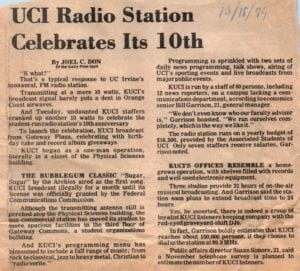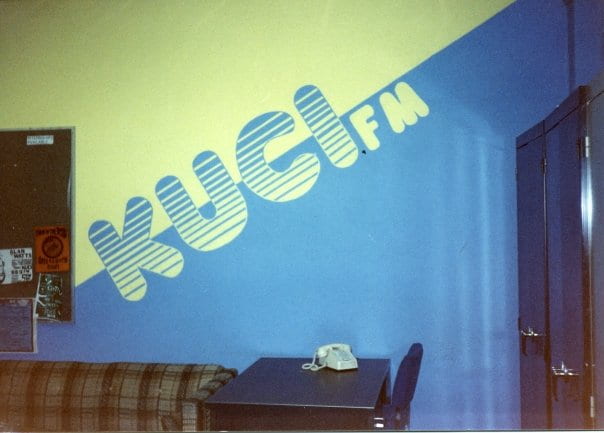
Happy 50th, KUCI
What a long, strange trip it’s been for the campus radio station
By Roy Rivenburg
(Published November 5, 2019)
It’s like radio roulette. On KUCI, Orange County’s off-kilter FM outpost, listeners never quite know what to expect.
The smorgasbord of audio oddities played during the station’s first half-century includes shows devoted to:
- Communist marching band music
- Solid waste disposal in St. Louis
- A 1930s “Tarzan” serial
- Forest pest control
- The musings of “Sweet” Ernie Smith, a black grad student who spun heavily scratched and warped Motown records as he railed against the “white imperial dogs” and “honkies” running the university

“Our philosophy has always been to provide things you’re not going to hear anywhere else,” says longtime station boss Kevin Stockdale, who joined KUCI in 1983 and describes his role as “part den mother, part prison warden.”
On Saturday, dozens of current and former DJs will celebrate KUCI-FM’s 50th birthday at a reunion party decorated with old playlists, photos, radio equipment and other artifacts from the past.
Born as a low-power AM pirate station in an Anteater dorm, KUCI has endured run-ins with the law, budget shortfalls, signal overrides and miscellaneous controversies to become a 24/7 bastion of free-form tunes and talk. But not everything it does is underground or unconventional.
In addition to airing UCI basketball and baseball games, as well as campus concerts and marquee speakers, the station has racked up an impressive list of celebrity interviews, including comedian Jerry Seinfeld, former Vice President Hubert Humphrey, author Ray Bradbury, labor leader Cesar Chavez, “Twilight Zone” creator Rod Serling, Monty Python member Eric Idle, media mogul Arianna Huffington, National Lampoon co-founder Doug Kenney and a litany of musicians, ranging from Ozzy Osbourne and Count Basie to the Red Hot Chili Peppers and Yanni.
UCI biology professor Anthony James, who earned his bachelor’s degree and Ph.D. at the university in the 1970s, recalls an episode from that decade that encapsulates the station’s unpredictable vibe: “One time, after an hour or so of psychedelic rock (think the Doors, Jimi Hendrix, Grateful Dead), the station suddenly began broadcasting live hillbilly music. The DJ invited listeners to ‘come on down’ to the Student Center, where the manager of UCI’s motor pool, a retired sheriff from Oklahoma, was calling out square-dance steps in front of a ragged band of hippies. Sixty or so people – undergraduates, grad students and faculty, all dressed in the latest flower-power gear – were swinging, twirling and dipping like a storm at sea.”
UCI Podcast: KUCI’s 50th anniversary with Kevin Stockdale.
The current guardian of that hoedown spirit is “Howdylicious,” a Sunday night showcase for “all that twangs.” It airs alongside programs dedicated to Celtic music, home gardening, German pop-rock and identity theft.
The birth of Anteater radio is “shrouded in mystery,” says Robert J. Morey in The History of KUCI: The First 25 Years or So, a 461-page treatise on the station’s rise. But some clues have emerged.
After KUCI’s largely forgotten pirate and student government-funded AM ancestors debuted in 1967 and ’68, the station jumped to the FM dial in October 1969, operating out of a storage closet in the Physical Sciences Building. The tiny studio was outfitted with two turntables, a tape machine and a primitive mixing console.
“There was no real schedule,” says Dean Okrand, who served as assistant station manager in 1970. “DJs would pop in when they felt like it, turn on the transmitter and do a show. It was anarchy at its best.”
Okrand liked to broadcast late-night “sound collages,” in which he’d play two records simultaneously, sometimes spinning one backward. He also had a job in a science lab down the hall, analyzing subatomic particles. If he was on duty there, he’d stop by the studio first, put on one of his favorite LPs and basically have his own personal soundtrack for work. “I just had to go back every 15 minutes to turn the album over,” says Okrand, who went on to become an Emmy-winning television sound mixer.

Things have come a long way since then.
The music library, for example, has ballooned from six albums and a box of 45s to roughly 40,000 LPs and 35,000 CDs, although few of KUCI’s 100 or so staff members ever dig through the stacks. “They explore new tunes digitally, not physically,” laments Stockdale, who presides over the station from an office crammed with action figures from “The Simpsons,” “Futurama,” “Lost,” and other sci-fi and animated series.
Another upgrade is the station’s reach. Until 1993, the running joke was that KUCI DJs “would have a bigger broadcast range if they just stood at a window and shouted,” observed the Los Angeles Times. At one point, that was literally true. In March 1981, KCRW, which used the same FM frequency (89.9), boosted its power and drowned out KUCI’s signal for five months, even on campus, according to Morey. KUCI finally resurfaced in September, after winning Federal Communications Commission permission to move down the FM dial to 88.9. In 1993, the station upped its power from 24 watts to 200 watts – still paltry by industry standards but strong enough to be heard across much of Orange County.
A few years later, KUCI further expanded its orbit by streaming online at KUCI.org. Men’s basketball draws the biggest Internet audience, typically about 100 people per game, Stockdale says.
One thing that hasn’t changed over time is the conundrum of what song was the first to air on KUCI. Author Morey uncovered two possibilities, one from station engineer Earl Arbuckle, who recalled playing the Youngbloods’ hit “Get Together” during a test broadcast on Sept. 12, 1969.
But other evidence suggests that the earliest song was “Sugar, Sugar,” by the Archies. Former New University reporter Bill Betts said he interviewed several KUCI staffers shortly after the station’s debut and they all named that tune as the introductory number. “If it’s folklore, it’s folklore that emerged within days” of KUCI becoming a legal radio station, Betts told Morey. There’s even a recording of Arbuckle testing the transmitter and playing “Sugar, Sugar,” although Morey says the tape was most likely made after the engineer’s September trial run.
The most played tracks by KUCI in 1969
Adding to the confusion, KUCI-FM’s original station manager, Gregg Wolford (who died in a car crash in January 1970), “was insistent that the Archies should not be played on KUCI, even for testing purposes,” Morey reports.
Last week, a third song claim emerged: “Yellow Submarine,” by the Beatles. The new account comes from Don Zweifel, who was cited in an October 1967 Anthill newspaper article as the leader of plans to launch an AM campus radio station. In a phone interview, he remembers putting egg crates on the studio walls for soundproofing and gets emotional recounting the grateful reactions of students to the station.
But Morey, who pored over hundreds of KUCI documents for his book, says he never saw any mention of Zweifel.
And so the first-song mystery continues. Perhaps, for a station that once advertised itself as “unplanned music for your planned community,” that’s entirely fitting.

KUCI milestones
Dec. 4, 1967: UCI’s student senate earmarks $2,700 to create an official campus radio station. Computer science major Craig Will spearheads the effort.
May 1968: Broadcasting from an Arroyo dorm room, KUCI formally premieres at 900 on the AM dial. Randy Rees, who took over as station manager after Will resigned to work on his sliding grades, leads a staff of about 10. Richard Privette is the program director.
Oct. 21, 1969: KUCI reincarnates as an FM station (89.9), operating from a closet-size room in the Physical Sciences Building. Depending on who’s telling the story, the first song it plays is “Sugar, Sugar,” by the Archies; “Get Together,” by the Youngbloods; or perhaps “Yellow Submarine,” by the Beatles.
March 18, 1973: The Beach Boys perform in Crawford Hall, and KUCI staffers string 3,000 feet of audio cable through treetops and across a parking lot to air the concert live.
January 1975: The station adopts a 24/7 programming schedule but struggles to maintain it until the 1980s.
March 14, 1981: Santa Monica College’s KCRW, which also uses the 89.9 frequency, boosts its power and drowns out KUCI’s signal. After five months of wrangling with the FCC, KUCI resurfaces on Sept. 1 at 88.9 FM.
September 1983: Biology freshman Kevin Stockdale joins KUCI and eventually ascends to the top management slot, where he has remained for three decades
July 1988: The station procures its first CD player. KUCI’s vinyl collection is estimated at 30,000 albums.
March 1993: KUCI cranks up its power from 24 watts to 200 watts and switches from mono to stereo. To celebrate, staffers dust off “Sugar, Sugar,” hoist Stockdale in the air and march him through the studio.
1997: KUCI begins webcasting at KUCI.org.
March 1, 2003: Honoring its album roots, the station holds an anniversary party marking 331/3 years of FM broadcasting.
June 14, 2014: In an unusual doubleheader, KUCI preempts the first two innings of Anteater baseball’s College World Series appearance to carry President Barack Obama’s UCI commencement speech, then cuts to the game after he finishes.
Sources: The History of KUCI by Robert J. Morey, Anthill, New University, interviews
UCI Station IDs
